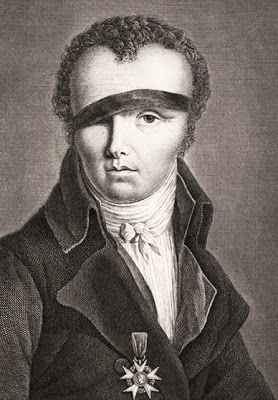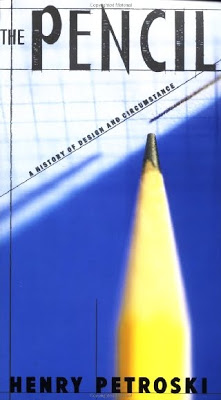Philosophy
 Nicolas-Jacques Conté
Nicolas-Jacques Conté
August 4th, 1755 to December 6th, 1805
Nicolas-Jacques Conté was a "French inventor who devised a method of manufacturing pencil leads by mixing a finely powdered graphite with finely ground clay particles, baked, and used encased in wood. His innovation was prompted when imported plumbago supplies were disrupted by war. He was the first to use graphite - and that is still used as the basis for making pencil leads today. Using different ratios of clay to graphite varies the hardness of the pencil lead. He was commissioned by Napoleon as chief of the balloon corps in Egypt, where he invented ways to improvise tools and machines necessary to provide bread, cloth, munitions, surgical instruments and engineers' tools. As a youth, he had worked as a portrait painter. He lost his left eye in a chemistry laboratory accident."
Nicolas-Jacques Conté [Wikipedia]
A huge pencil website...
Bob Truby's Band Name Pencils
 The Pencil: A History of Design and Circumstance
The Pencil: A History of Design and Circumstance
by
Henry Petroski
ISBN-10: 0679734155
ISBN-13: 978-0679734154
- False Needs, Technological Regress, And The Mechanical Pencil
As I wasted a perfectly good hour of vacation fixing the shorter of the short people's mechanical pencil -- a stocking stuffer he asked for and received -- Marx's notion of false needs came to mind, that is, the idea that in order to sell more...
- Karl Richard Lepsius...german Egyptologist
Karl Richard Lepsius December 23rd, 1810 to July 10th, 1884 I dedicate this to my London colleague [an Egyptologist] who has been stalled for hours with her retired Oxford don father at Heathrow Airport do to bad weather. They are on their way to Luxor...
- Nicolas Lémery And "spiky" Atoms
Nicolas Lémery November 17th, 1645 to June 19th, 1715 An early empiricist. His "corpuscular theory" was sophomoric but inventive. French chemist and pharmacist who prepared a comprehensive dictionary of pharmaceuticals in the Pharmacopée universelle...
- Massive Head Of Ramesses Ii And Henry Salt
Henry Salt June 14th, 1780 to October 30th, 1827 Those must have been the good old days of plunder...long before the activities of Zahi Hawass, the flamboyant Secretary General of the Egyptian Supreme Council of Antiquities. Bill Ashworth in the Linda...
- Napoleon, Pierre-françois-xavier Bouchard, Rosseta Stone
Pierre-François-Xavier Bouchard April 29th, 1771 to 1832 A yesterday birthday. Bill Ashworth in the Linda Hall Library Newsletter wrote... Pierre-François-Xavier Bouchard, a lieutenant and engineer in the French army, was born Apr. 29, 1771. Bouchard...
Philosophy
No 2...Pencils--Nicolas-Jacques Conté
 Nicolas-Jacques Conté
Nicolas-Jacques ContéAugust 4th, 1755 to December 6th, 1805
Nicolas-Jacques Conté was a "French inventor who devised a method of manufacturing pencil leads by mixing a finely powdered graphite with finely ground clay particles, baked, and used encased in wood. His innovation was prompted when imported plumbago supplies were disrupted by war. He was the first to use graphite - and that is still used as the basis for making pencil leads today. Using different ratios of clay to graphite varies the hardness of the pencil lead. He was commissioned by Napoleon as chief of the balloon corps in Egypt, where he invented ways to improvise tools and machines necessary to provide bread, cloth, munitions, surgical instruments and engineers' tools. As a youth, he had worked as a portrait painter. He lost his left eye in a chemistry laboratory accident."
Nicolas-Jacques Conté [Wikipedia]
A huge pencil website...
Bob Truby's Band Name Pencils
 The Pencil: A History of Design and Circumstance
The Pencil: A History of Design and Circumstance by
Henry Petroski
ISBN-10: 0679734155
ISBN-13: 978-0679734154
Footnote:
From Professor Bill Ashworth Jr. [University of Missouri, Kansas City]...
Nicolas-Jacques Conté, a French inventor and balloonist, was born Aug. 4, 1755. Conté was a member of the scientific corps of Napoleon's expedition to Egypt, 1798-1801. He was a skilled machinist, and his first task was to replace all the measuring equipment that was lost when the flagship of the invasion fleet sank on arrival. After that, he gathered information on the crafts of Egypt, visiting the shops of the potters, glass-blowers, and blacksmiths, and making finished drawings of their tools and methods, all of which would be published in the great Description de l'Egypte (1809-1828). But perhaps his greatest contribution was the invention of an engraving machine. When it came time to publish the results of the expedition, the editors were faced with the task of engraving hundreds of extremely large plates, with much of the space filled with the Egyptian sky, which had to be shaded in. Previously the shading would have been engraved by hand and would have taken thousands of man-hours. Conté's machine could do all this laborous shading mechanically, and in a fraction of the time. It is safe to say that, without it, those grand plates of the Pyramids and the temple at Karnak would have been a lot longer emerging from the press. Conté lost an eye in an early explosion, and in the famous group portrait of the scientists of the Institute of Egypt, Conté is easy to spot, with his rakish eye patch, standing just behind Napoleon ( http://www.lindahall.org/events_exhib/exhibit/exhibits/napoleon/institute_zoom.shtml ).
From Professor Bill Ashworth Jr. [University of Missouri, Kansas City]...
Nicolas-Jacques Conté, a French inventor and balloonist, was born Aug. 4, 1755. Conté was a member of the scientific corps of Napoleon's expedition to Egypt, 1798-1801. He was a skilled machinist, and his first task was to replace all the measuring equipment that was lost when the flagship of the invasion fleet sank on arrival. After that, he gathered information on the crafts of Egypt, visiting the shops of the potters, glass-blowers, and blacksmiths, and making finished drawings of their tools and methods, all of which would be published in the great Description de l'Egypte (1809-1828). But perhaps his greatest contribution was the invention of an engraving machine. When it came time to publish the results of the expedition, the editors were faced with the task of engraving hundreds of extremely large plates, with much of the space filled with the Egyptian sky, which had to be shaded in. Previously the shading would have been engraved by hand and would have taken thousands of man-hours. Conté's machine could do all this laborous shading mechanically, and in a fraction of the time. It is safe to say that, without it, those grand plates of the Pyramids and the temple at Karnak would have been a lot longer emerging from the press. Conté lost an eye in an early explosion, and in the famous group portrait of the scientists of the Institute of Egypt, Conté is easy to spot, with his rakish eye patch, standing just behind Napoleon ( http://www.lindahall.org/events_exhib/exhibit/exhibits/napoleon/institute_zoom.shtml ).
- False Needs, Technological Regress, And The Mechanical Pencil
As I wasted a perfectly good hour of vacation fixing the shorter of the short people's mechanical pencil -- a stocking stuffer he asked for and received -- Marx's notion of false needs came to mind, that is, the idea that in order to sell more...
- Karl Richard Lepsius...german Egyptologist
Karl Richard Lepsius December 23rd, 1810 to July 10th, 1884 I dedicate this to my London colleague [an Egyptologist] who has been stalled for hours with her retired Oxford don father at Heathrow Airport do to bad weather. They are on their way to Luxor...
- Nicolas Lémery And "spiky" Atoms
Nicolas Lémery November 17th, 1645 to June 19th, 1715 An early empiricist. His "corpuscular theory" was sophomoric but inventive. French chemist and pharmacist who prepared a comprehensive dictionary of pharmaceuticals in the Pharmacopée universelle...
- Massive Head Of Ramesses Ii And Henry Salt
Henry Salt June 14th, 1780 to October 30th, 1827 Those must have been the good old days of plunder...long before the activities of Zahi Hawass, the flamboyant Secretary General of the Egyptian Supreme Council of Antiquities. Bill Ashworth in the Linda...
- Napoleon, Pierre-françois-xavier Bouchard, Rosseta Stone
Pierre-François-Xavier Bouchard April 29th, 1771 to 1832 A yesterday birthday. Bill Ashworth in the Linda Hall Library Newsletter wrote... Pierre-François-Xavier Bouchard, a lieutenant and engineer in the French army, was born Apr. 29, 1771. Bouchard...
